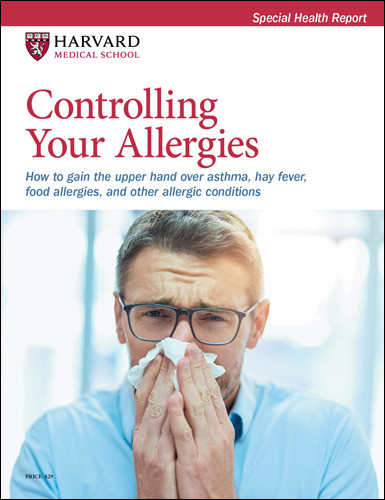What to do about Allergies

the Coughing, Sneezing,
Wheezing and Itchy Eyes
Caused by Allergies!
Allergies affect millions of people worldwide. From molds and fungi to pet dander and pollen to insects to medications and foods—it seems there is no end to the list of things that can cause an allergic reaction.
Symptoms can range from inconvenient like a mild rash or runny nose to chronic, debilitating conditions and even life-threatening anaphylaxis. To help you understand what causes allergy attacks, the tests your doctor may order to diagnose your allergy, the best ways to control your symptoms, and more the experts at Harvard Health Publishing created Controlling Your Allergies: How to gain the upper hand over asthma, hay fever, food allergies, and other allergic conditions.
In this new report, Harvard Medical School experts reveal:
| ✓ | Why rubbing your eyes makes itchy “allergy eyes” worse. |
| ✓ | What works better than lotions for treating eczema |
| ✓ | Why you need to bring your inhaler with you to your doctor’s office — and why diagnosing asthma in adults can be difficult |
| ✓ | Why forecasters pollen counts may not help you avoid the worst days for pollen |
| ✓ | 7 tried and true secrets that can reduce the presence of dust mites (a major cause of allergies) by 50% or more. |
| ✓ | 11 tips for preventing mold inside your home. |
| ✓ | The heartburn medicine that can be used to treat hives. |
And this is just a fraction of the practical and helpful information you’ll find in this groundbreaking report.

Fascinating Facts on Allergies
| ✓ | Firstborn children are more likely to have food allergies than younger siblings |
| ✓ | A Swedish study found kids from families that hand-washed dishes vs. using a dishwasher were less likely to develop eczema or asthma and hay fever |
| ✓ | Children raised in households with furry pets have lower risks of allergies |
| ✓ | Common misconception: Using an “EpiPen” or autoinjector epinephrine device doesn’t mean you’re in the clear. It’s only a stopgap measure that works until you can get to the hospital |
| ✓ | The contrast dye used for CT scans and other imaging tests can cause severe allergic reactions in some people |
Order Your Copy now (you can even start reading today) and discover:
| ✓ | Why repeated exposures to an allergen often mean lower levels can kick off a reaction |
| ✓ | How treating allergic rhinitis may help improve asthma symptoms too |
| ✓ | That eye allergies typically decrease with age |
| ✓ | Why the concentration of a steroid cream isn’t a good indicator of its strength. For example — betamethasone velerate 0.1% is more potent than hydrocortisone 2.5% |
| ✓ | The most effective treatment for hives |
| ✓ | Why drug allergies are more likely to show up during a hospital stay |
| ✓ | How exercise can kick off a severe anaphylactic reaction and how to prevent this serious problem |
| ✓ | A new way to desensitize people with peanut allergies — with toothpaste! |
| ✓ | And there’s so much more! |